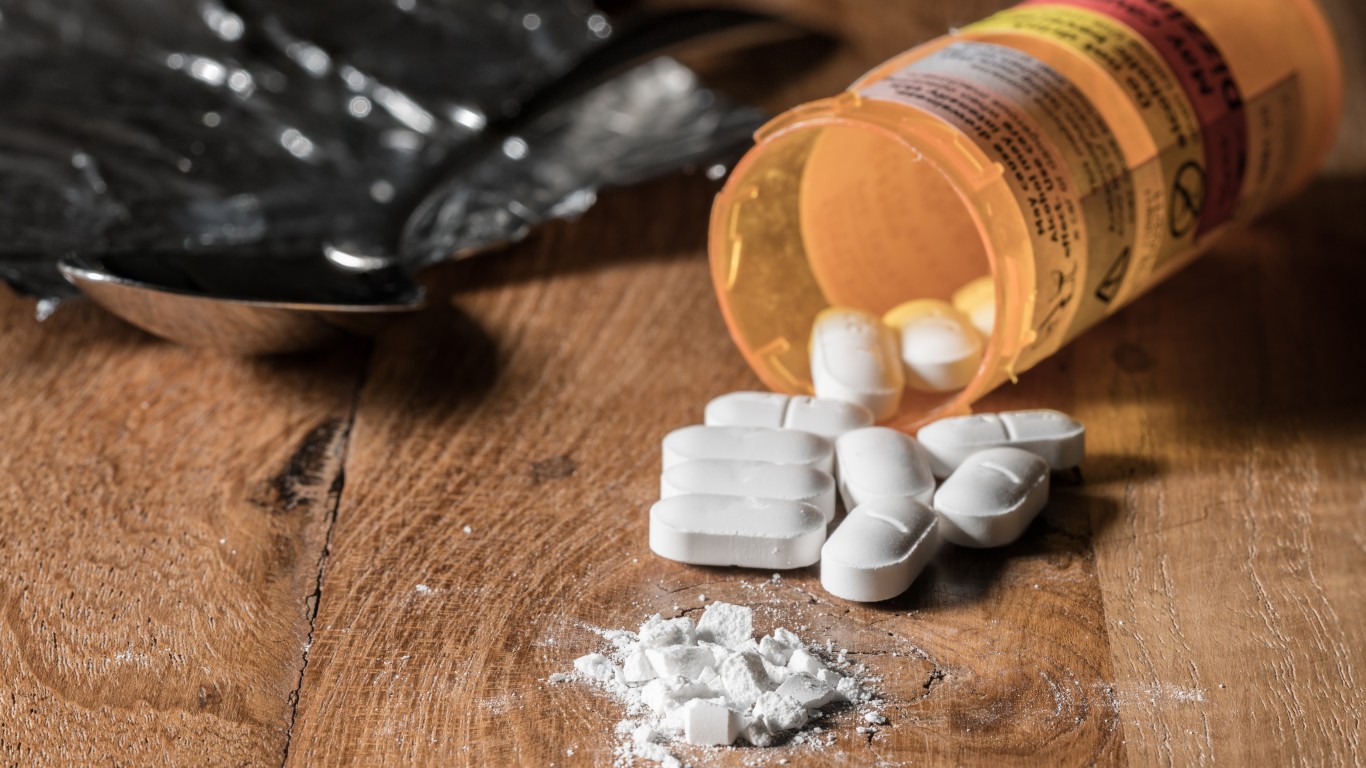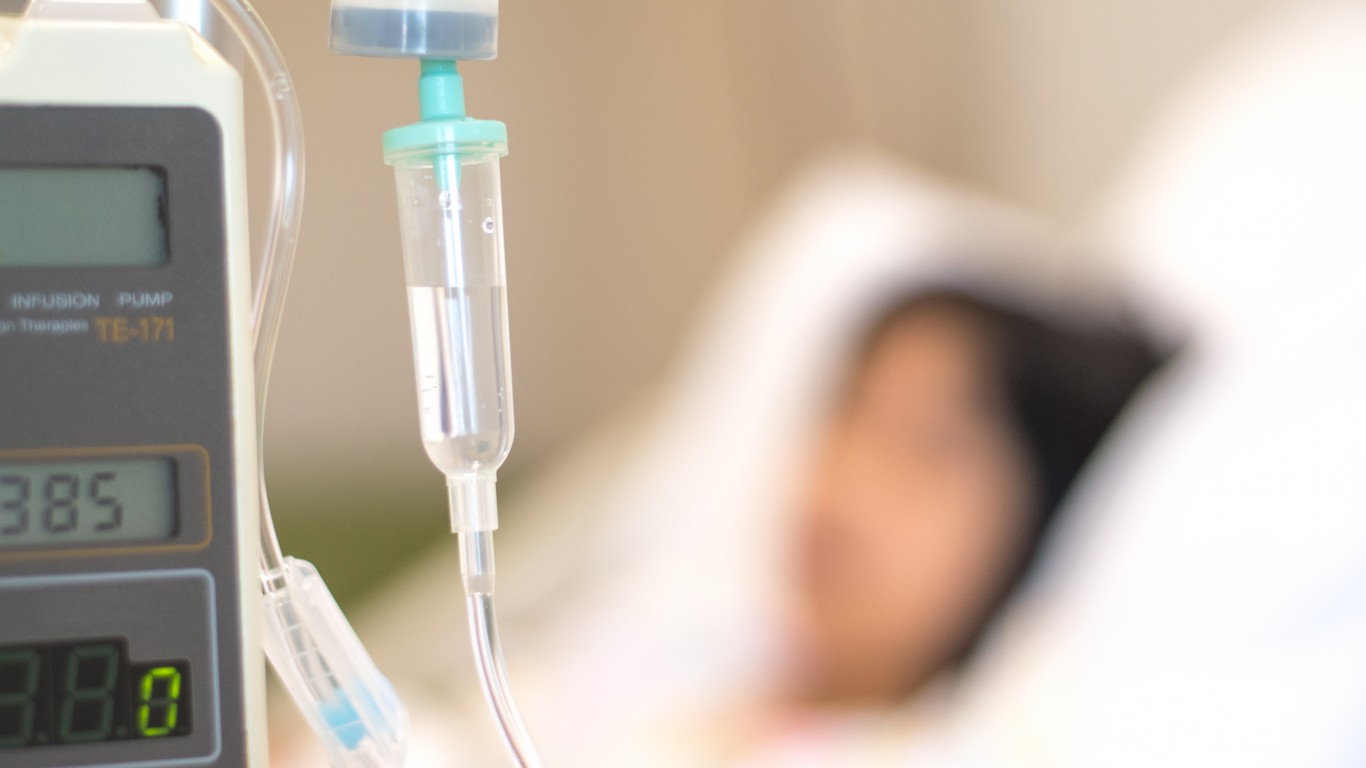

When companies run into legal issues in which they face potentially endless numbers of trials in numerous venues in America, it can create a tough time managing them. Johnson & Johnson (NYSE: JNJ) faces a wave of lawsuits over its role in the opioid addiction that has swept through America. And hearing about a single case going against Johnson & Johnson to the tune of $572 million sounds on the surface like it could be devastating.
It is important to consider that the largest companies in America, Johnson & Johnson among them with a value of nearly $350 billion, have very deep pockets, many avenues to raising capital to buffer themselves and their shareholders against what might otherwise be a catastrophic wipeout for smaller companies. This is an instance when Johnson & Johnson is trading higher on the news, but some smaller public companies tied into the opioid crisis are taking it on the chin.
An Oklahoma judge ruled on Monday afternoon that Johnson & Johnson’s role in promoting and marketing opioids helped contribute to Oklahoma’s state opioid crisis. While the ruling was set at more than $572 million against the company, it turns out that some analysts on Wall Street were expecting that the dollar-cost might be far worse. Little surprise, Johnson & Johnson has already said that it plans to appeal this case.
Johnson & Johnson and other big pharmaceutical companies and drug distributors face countless opioid-related legal cases in many venues in the United States. Johnson & Johnson is said to have had just 1% market share in opioids in Oklahoma, and rivals Purdue and Teva had been reported as having settled their cases in Oklahoma for $270 million and $85 million, respectively.
What matters about Oklahoma is how it might be used as a model for other states in America to determine a total outcome. According to the World Population Review site, Oklahoma’s 2019 population estimate of about 3.95 million people ranks as 28th in the order of the 50 states, plus Puerto Rico and Washington, D.C., by population, though it was about 1.19% of the total U.S. population.
If legal verdict scorers try to use this Oklahoma ruling as a model, there are several ways to look at it on a static basis. The actual ruling said, “J&J’s opioid marketing, in its multitude of forms, was false, deceptive and misleading ” Assume that Johnson & Johnson’s appeal actually shaves off some of the verdict, even down to $500 million, and then come up with a blend that the model could average the same in 50 states and Puerto Rico and Washington, D.C. That’s $26 billion.
If verdict scorers want to use a population ratio at 1.19% for Oklahoma’s weight in the entire nation with a $500 million base case, then the total could be somewhere around $42 billion.
Not everyone agrees that this verdict should be construed as a victory. Berenberg Capital Markets reportedly has said that Johnson & Johnson may now be open to as much as $150 billion in damages, when adding up state, federal, multi-district litigation and other regulatory jurisdictions into the mix.
Merrill Lynch has only a Neutral rating on Johnson & Johnson, and the firm said that the company’s appeal plans through Oklahoma’s intermediate courts and then potentially up to the U.S. Supreme Court could take three to five years. The firm’s own legal checks show that Johnson & Johnson’s strongest aspect of its case is that the state’s application of its public nuisance law violated the company’s legal due process and that this use was unprecedented and is therefore subject to future legal challenge. The firm sees no immediate ramifications here and that Johnson & Johnson could raise an additional $9 billion to $10 billion before losing a AAA rating and could raise another $40 billion to $50 billion before moving its rating down to BBB. Despite a Neutral rating, Merrill’s price objective is $150.
Credit Suisse has an Outperform rating and $156 target price on the stock. The firm believes that the Oklahoma court decision actually reduces some of the uncertainties and may even potentially help Johnson & Johnson shares ultimately to move higher. It pointed out that Oklahoma prosecutors had sought damages of $17 billion.
Morningstar issued a note on the matter saying that the $572 million verdict was lower than many had expected and that the appeals process should take several years and should fall to a lower dollar amount. Morningstar’s note said the firm believes that the company largely provided appropriate marketing support in its sales of opioid drugs. Morningstar continues to model about $1 billion in total opioid litigation costs for Johnson & Johnson.
Determining the outcome of all the outstanding cases tied to the opioid crisis is still very difficult to project. The decision against Johnson & Johnson was expected, but the dollar amount was an unknown prior to this verdict. Another consideration is that big cases such as this often take years to play out.
In many ways, the cases against the opioid makers look and feel a lot like the Engle tobacco case, which was against the cigarette makers (without the benefit of history to know the verdict). The key difference is that most smokers knew for years that they were killing themselves slowly by smoking. It seems that many opioid users were not aware of just how addictive the drugs were nor that they would contribute to their deaths or the years of problems.
Shares of Johnson & Johnson traded up 3.4% to $132.15 on Tuesday morning, in a 52-week range of $121.00 to $148.99. Other companies that have seen opioid exposure in cases were seeing big selling pressure in reaction to the ruling.
Teva Pharmaceutical Industries Ltd. (NYSE: TEVA) traded down 5.8%, at $6.99 in a 52-week range of $6.07 to $25.13.
Endo International PLC (NASDAQ: ENDP) was down 8%, at $2.67 in a 52-week range of $2.14 to $18.40.
Mallinckrodt PLC (NYSE: MNK) was trading down 10% to $3.80, with a 52-week range of $3.79 to $35.89.
Drug distributor McKesson Corp. (NYSE: MCK) shares were down 2% to $144.10, in a 52-week range of $106.11 to $150.82. It and other distributors reportedly have been in talks of a $10 billion settlement over its role in distributing opioids to doctors. Distributor Cardinal Health Inc. (NYSE: CAH) traded down 1.5% to $43.17 on Tuesday. Its 52-week range is $41.03 to $58.31.
Take This Retirement Quiz To Get Matched With An Advisor Now (Sponsored)
Are you ready for retirement? Planning for retirement can be overwhelming, that’s why it could be a good idea to speak to a fiduciary financial advisor about your goals today.
Start by taking this retirement quiz right here from SmartAsset that will match you with up to 3 financial advisors that serve your area and beyond in 5 minutes. Smart Asset is now matching over 50,000 people a month.
Click here now to get started.
Thank you for reading! Have some feedback for us?
Contact the 24/7 Wall St. editorial team.



